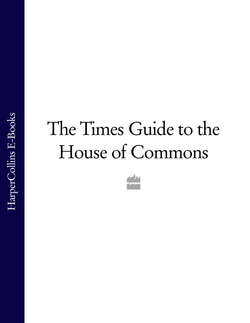Читать книгу The Times Guide to the House of Commons - Литагент HarperCollins USD, Ю. Д. Земенков, Koostaja: Ajakiri New Scientist - Страница 63
Private Member’s Bills
ОглавлениеMost legislation is put forward by the Government, but in every session a few Bills sponsored by backbench MPs become law. Most of these emerge through a ballot held at the beginning of each session. A total of 13 Fridays in each session are allotted to Private Member’s Bills, which go through the same stages as government Bills, but only seven Fridays are allotted to second readings: the other six are for later stages.
An MP who is lower than seventh will have to put their Bill down for a Friday on which it will not be the first to be debated. This involves astute tactics to judge which Bills will be controversial and therefore face opposition. Debates on important Bills often last most of the Friday sitting (from 9.30am to 2.30pm). Sponsors of Bills have to mobilise support among their fellow MPs since a closure motion to end the debate and have a second reading vote requires the support of 100 MPs, quite a high hurdle for a Friday when many MPs like to be back in their constituencies. Without a closure motion, a Bill can be blocked by a single MP shouting, “Object”, in which case the debate is adjourned. The same happens to Bills that have not been debated. In practice, they then have virtually no chance of becoming law.
Bills introduced under this procedure vary enormously in importance, from highly controversial subjects such as hunting and abortion to minor adjustments of existing law. The Government sometimes offers backbenchers high in the ballot fully drafted Bills that have not found a place in the Queen’s Speech programme. Pressure groups and constituents will also bombard MPs with ideas.
Another way for a backbencher to introduce legislation is under the ten-minute rule, which allows an MP the chance to make a brief speech in favour of introducing a Bill. Another MP can speak against and the proposal can then be voted upon. Even if successful, however, the Bill then has to take its chance for a second reading on a Friday. In practice, most ten-minute Bill debates, held in prime time twice a week after Question Time and any statements, offer a chance for an MP to get publicity for an issue. Bills can be introduced without debate by any backbench MP but they also have to compete for time on Fridays coming after the ballot bills. So they have very little chance of becoming law unless they are uncontroversial.
